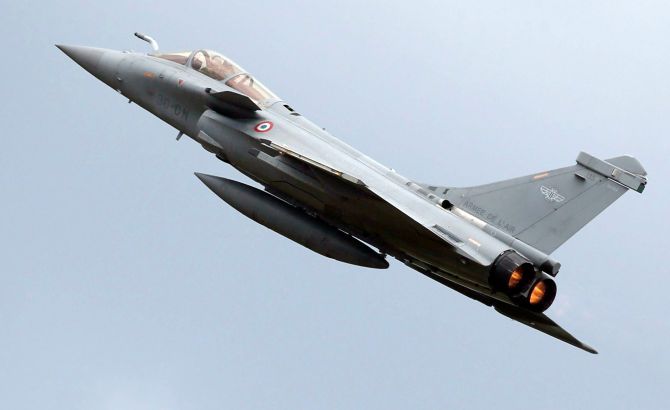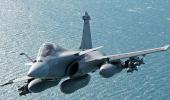Delivery of a great operational machine must not get affected to settle political scores, says Air Marshal Anil Chopra (retd).

The Rafale deal has all of a sudden come into focus with the Congress party alleging a scam in the unilateral announcement of a curtailed deal reducing the earlier figure of 126 aircraft to just 36, and paying a disproportionately higher price per piece of equipment. It also alleged that the government did not follow rules and procedures.
Refuting the allegations, Defence Minister Nirmala Sitharaman countered that the United Progressive Alliance government had not finalised the price of the contract, so comparison of cost is imaginary.
By actually purchasing the 36 aircraft in fly-away condition, there has been a saving of Rs 12,600 crore (Rs 126 billion), she stated.
It is further said that delay in finalising the deal by UPA had operational implications and fly-away numbers had to be increased to 36 for quicker inductions.
The original plan to buy 126 fighter aircraft was first mooted during the Vajpayee government.
The Request for Proposal for procurement of 126 Medium Multi-Role Combat Aircraft was finally issued in 2007 by the UPA government.
After a gruelling technical and flight evaluation of the six contending aircraft, in 2011, the Indian Air Force declared that the Rafale and Eurofighter Typhoon had met the selection criteria.
Later in 2012, Rafale was declared the L-1 (lowest) bidder by the government and contract negotiations began.
A high-level Technical Oversight Committee headed by the scientific advisor to the raksha mantri was constituted to go through the full procedural and technical compliance.
The TOC report was put up to the then UPA government and confirmed all processes had been correctly followed.
The Contract Negotiations Committee then arrived at the benchmarking cost after applying escalation rates.
The deal kept getting stalled due to disagreements over production in India, with Dassault refusing to take quality assurance responsibility for the 108 Hindustan Aeronautics Limited-manufactured Rafale and major difference related to man-hours required to produce the aircraft by HAL in India.
The contract for 126 Rafales, services, and parts, it was being said, may have been worth up to $20 billion. But no contract was signed during the UPA regime.
Meanwhile, in February 2015, Egypt became Rafale's first international customer when it officially ordered 24 Rafales, reportedly for $5.9 billion (Rs 38,0166 crore/Rs 380.16 billion).
In May 2015, Qatar ordered 24 Rafales for $7.02 billion (Rs 45,233 crore/Rs 452.33 billion). These two deals set some price benchmarks.
With Dassault unwilling to commit on the man-hours required by HAL and assure HAL production quality, a stalemate was emerging.
Any return from this point would mean restarting the entire process. That would be detrimental to national security.
- 4 puzzling questions about the Rafale deal
- Has India paid more for the Rafales?
- Was Rafale a must for the IAF?
Under the circumstances, there was no alternative but to withdraw the original tender. Then defence minister Manohar Parrikar reportedly advised Prime Minister Narendra D Modi that the central vigilance commission guidelines do not allow negotiations with the L2 (next best) bidder.
The only way, the then defence minister suggested, was to scrap the tender and buy a minimum number of Rafale jets off the shelf to fill a critical gap in the IAF inventory.
In April 2015, during PM Modi's visit to Paris, India requested the rapid delivery of 36 Rafales in fly-away condition. It was to be through an Inter-Governmental Agreement.
India officially withdrew the 126-aircraft MMRCA tender on July 30, 2015.
Finally, on September 23, 2016, India and France signed the contract for the purchase of 36 off-the-shelf Rafales in a deal worth €7.8 billion (Rs 59,147 crore/Rs 591.47 billion).
The deliveries will begin in 2019. The deal includes weapons and spares.
Dassault has selected an Indian partner (Reliance Defence) for offsets servicing. The quicker delivery of 36 aircraft gives leverages for further orders and the route to be taken.
Inter-Governmental Agreements have many advantages, and have sovereign backing. India has entered into similar deals with the US for many aircraft recently.
As far as due process is concerned, the offer had been evaluated by the Defence Acquisition Council three times and all its recommendations had been incorporated.
The proposal was then put up for the Cabinet Committee on Security's arpproval and the IGA signed only after that.

The final negotiated price for 36 Rafales package along with initial consignment of weapons, simulators, ground infrastructure and services was fixed.
The average unit cost of Rafale aircraft thus turned out to be €92 million (Rs 690 crore/Rs 6.9 billion).
The package cost of 126 or 36 Rafale cannot be directly compared as the deliverables in the two cases are different.
Savings are quantified as €1.6 billion (Rs 12,600 crore).
Through Article 12 of the IGA, France is to facilitate the implementation of 'Make in India' by the industrial supplier through offsets for 50 per cent value of the total supplies.
The offset proposal also includes provisions for transfer of sophisticated design technology. The specifics of design technologies are presently under discussion at the government level.
The Rafale is a multi-role aircraft equipped with a wide range of modern weapons. It is meant to perform air supremacy, interdiction, aerial reconnaissance, deep surface-strike, anti-ship strike and nuclear deterrence missions. It is often referred to as an 'omni-role' aircraft.
The 36 Rafales being delivered to India will have many IAF specific enhancements. The delivery schedule has been shrunk by nearly six months.
The agreement stipulates that the company will ensure a minimum 75 per cent of fleet serviceability. The aircraft has been used in combat over Afghanistan, Libya, Mali, Iraq and Syria.
Several upgrades to the weapons and avionics of the Rafale are planned to be introduced by 2018.
It is indeed a great deal. Delivery of a great operational machine must not get affected to settle political scores.
Air Marshal Anil Chopra (retd), a test pilot, was the team leader of the MiG-21 Upgrade Programme in Russia. He commanded India's flight test centre, Aircraft and Systems Testing Establishment.










